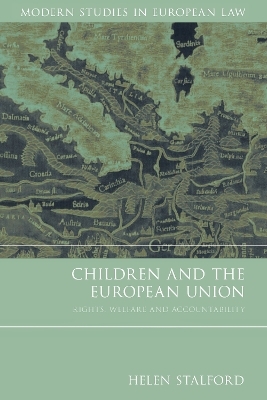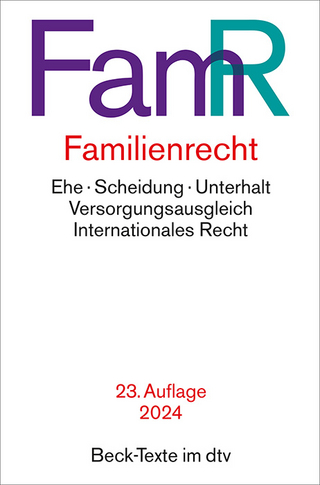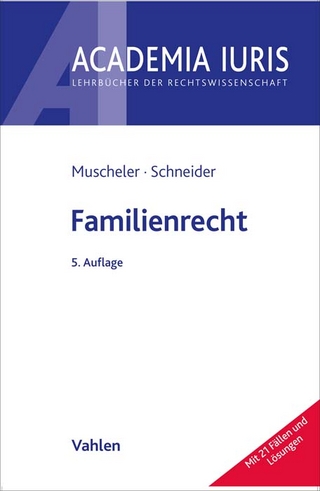
Children and the European Union
Hart Publishing (Verlag)
978-1-84113-765-0 (ISBN)
This book examines in detail the status of children in the EU. Drawing on a range of disciplinary perspectives, including the sociology of childhood and human rights discourse, it offers a critical analysis of the legal and policy framework underpinning EU children's rights across a range of areas, including family law, education, immigration and child protection.
Traditionally children's rights at this level have been articulated primarily in the context of the free movement of persons provisions, inevitably restricting entitlement to migrant children of EU nationality. In the past decade, however, innovative interpretations of EU law by the Court of Justice, coupled with important constitutional developments, have prompted the development of a much more robust children's rights agenda. This culminated in the incorporation of a more explicit reference to children's rights in the Lisbon Treaty, followed by the Commission's launch, in February 2011, of a dedicated EU 'Agenda' to promote and safeguard the rights of the child.
The analysis presented in this book therefore comes at a pivotal point in the history of EU children's rights, providing a detailed and critical overview of a range of substantive areas, and making an important contribution to international children's rights studies.
Helen Stalford is Professor of Law and Director of the European Children's Rights Unit at the School of Law and Social Justice, University of Liverpool.
Introduction: Children and the European Union
1. The Value and Scope of EU Action in Relation to Children
Introduction
Is There a Need for EU Action in the Field of Children's Rights?
The Added Value of EU Action in Relation to Children's Rights
The Strategic Importance of Investing in Children's Rights at EU Level
Valuing and Facilitating Children's Present Contribution to the EU
Does the EU have the Capacity to Regulate Children's Rights?
The EU's Institutional Capacity to Drive Children's Rights Forward
The Importance of a Reliable Evidence Base
Key Dynamics Shaping the Development of Children's Rights at EU Level
Defining the Boundaries between EU Action and Domestic Action in the Field of Children's Rights
Defining 'Child' under EU Law
'Child' as an Age-Based Construct under EU Law
'Child' as a Biological Construct under EU Law
'Child' as a Dependency-Based Construct under EU Law
Conclusion
2. The Ideology of EU Children's Rights
Introduction
Defining a Rights-Based Approach to Regulating Children's Lives
The Legal Currency of Fundamental Rights at EU Level
Sources of Children's Rights at EU Level
The UNCRC as an EU Children's Rights Tool
The Legal Status of the UNCRC at EU Level
The ECHR as a Children's Rights Tool
Children's Rights and the Charter of Fundamental Rights of the European Union
The EU's Capacity to Advance Children's Rights: A Question of Competence
Additional Conceptual Frameworks for Pursuing Children's Rights at EU Level
EU Citizenship as a Children's Rights Mechanism
Non-Discrimination as a Normative Framework for Pursuing Children's Rights
Using EU Non-Discrimination Law to Protect Children's Rights
Social Inclusion as a Framework for Protecting Children's Rights
Conclusion
3. Children, Family Life and EU Migration Law
Introduction
Adopting a Rights-Based Approach to Migrant Children's Family Life
The Nature and Scope of Children's Family Rights under EU Migration Law
Conceptualisations of 'Child' and 'Family' under EU Migration Law
The Family Rights of Third Country Nationals under EU Law
Restrictions on Children's Rights under Immigration Law
The Importance of 'Dependency' in Determining Migrant Children's Family Rights
Extricating Children's Family Rights from the Economic/ Self-Sufficiency Nexus?
The Nature and Scope of 'Separated' Children's Rights under EU Immigration Law
The Importance of Detaching Children's Migration Status from that of their Family
Situating Children within Migration Research
Conclusion
4. Children's Rights under EU Family Law: Custody, Access and Parental Child Abduction
Introduction
The Scope of and Reasons for EU Family Law
The Position of Children in the Divorcing Family: Sociological Perspectives
The Evolution of EU Family Law Regulating Divorce and Parental Responsibility
The Nature and Scope of Children's Rights Provision under the Brussels IIbis Regulation
EU Family Law and the Best Interests Principle
The Content and Scope of the Best Interests Principle under Brussels IIbis
The Growing Prominence of Best Interests in Child Abduction Cases? Reconciling Neulinger and Zarraga
Brussels IIbis and the Voice of the Child
Age and Capacity as a Barrier to Child Participation
Divergence Between National Child Consultation Procedures
Child Participation and the Six Week Deadline in Child Abduction Cases
Conclusion
5. Maintenance, Mediation and the Future of EU Family Law
Introduction
Enforcing Child Maintenance Cross-Nationally
EU Legal Framework Governing Cross-National Child Maintenance
Towards Harmonisation of Family Law? The New Rules on Applicable Law
Is the EU Maintenance Regulation Compatible with Children's Rights?
Recovery of Child Maintenance under EU Free Movement Law
EU Developments in the Field of Family Mediation
Achieving Effective Cross-National Mediation
EU Mediation Directive
Mediation: Empowering Adults but Disempowering Children?
Problems of Enforcing Mediated Agreements Relating to Children
Is a Separate Legal Instrument Governing Cross-Border Mediation Necessary?
Children, the Lisbon Treaty and the Future of EU Family Law
Conclusion
6. Education, Children's Rights and the EU
Introduction
The Source and Scope of Children's 'Right' to Education
The Nature and Scope of Children's Educational Rights under EU Education Law and Policy
Upholding Children's Educational Rights as an Aspect of the EU's Social Agenda
EU Education Policy and the Open Method of Co-ordination
Promoting Children's Agency through EU Education Measures: Active Citizenship and Children's Personal Development
Children's Educational Rights under EU Migration Law
The Limitations of a Basic 'Equality of Access' Approach to Education
Beyond a Basic Access: Rights for Migrant Children
Upholding Educational Rights through the EU's Equality Framework
Tackling Discrimination in Education on Grounds of Disability
Tackling Discrimination in Education on Grounds of Ethnicity: Roma
Conclusion
7. Child Protection and EU Law
Introduction
An Overview of the Legal and Policy Framework Underpinning EU Child Protection Measures
EU Child Protection Legislation
EU Efforts to Combat Child Trafficking
Child Protection Law and the EU Internal Market
EU Child Sexual Exploitation and Abuse Legislation
The Development of an EU Child Protection Infrastructure
Added Value or Empty Rhetoric? Assessing the Effectiveness of EU Action in the Field of Child Protection
Is EU Child Protection Legislation Compatible with Children's Rights?
Added Value of EU Intervention in International Child Protection
The Enforceability of EU Child Protection Measures
Adopting a Multi-Levelled, 'Roots and Branches' Approach to Child Protection
Importance of Cross-Departmental and Cross-Institutional Collaboration in Child Protection
Enhancing the Knowledge Base
The Future of EU Child Protection
Conclusion
8. Children's Rights and EU Enlargement
Introduction
Membership 'Conditionality' as a Mechanism for Promoting Children's Rights
Children's Rights and the Political Criteria: Using Human Rights 'Conditionality' to Enhance Children's Rights
The Importance of Context in Applying EU's Human Rights Conditionality
The Selective Nature of EU Human Rights Conditionality
Children's Rights and the Economic Criteria
Children's Rights and the Legal Criteria
Complementing EU Conditionality with Action 'On the Ground'
Upholding Children's Rights Post-Accession
Acceding to What? Scrutinising the Quality of the EU Children's Rights Measures to which Accession States are Expected to Conform
The Mixed Blessing of Enhanced Mobility Rights Following EU Accession
Sustaining Children's Rights Protection in the Post Accession Environment
Ask Not What the EU Can Do for Children's Rights in the Accession States, But What the Accession States Can Do for Children's Rights in the EU
Conclusion
Conclusion: The Future of Children's Rights in the European Union
The EU's Flawed Conceptualisation of Children's Rights: From Subversion to Insertion to Perversion
The Hegemony of the Child Protection Agenda at EU Level
More Than Just a Website: Children's Participation in the EU
Square Pegs and Round Holes?: Expectations of the EU's Role in Relation to Children's Rights
The EU as Regulator, Co-ordinator and Supporter
Institutional, Procedural and Political Blockages
Achieving Better Accountability—For What and to Whom?
| Reihe/Serie | Modern Studies in European Law |
|---|---|
| Verlagsort | Oxford |
| Sprache | englisch |
| Maße | 156 x 234 mm |
| Gewicht | 399 g |
| Themenwelt | Recht / Steuern ► EU / Internationales Recht |
| Recht / Steuern ► Privatrecht / Bürgerliches Recht ► Familienrecht | |
| ISBN-10 | 1-84113-765-0 / 1841137650 |
| ISBN-13 | 978-1-84113-765-0 / 9781841137650 |
| Zustand | Neuware |
| Haben Sie eine Frage zum Produkt? |
aus dem Bereich


